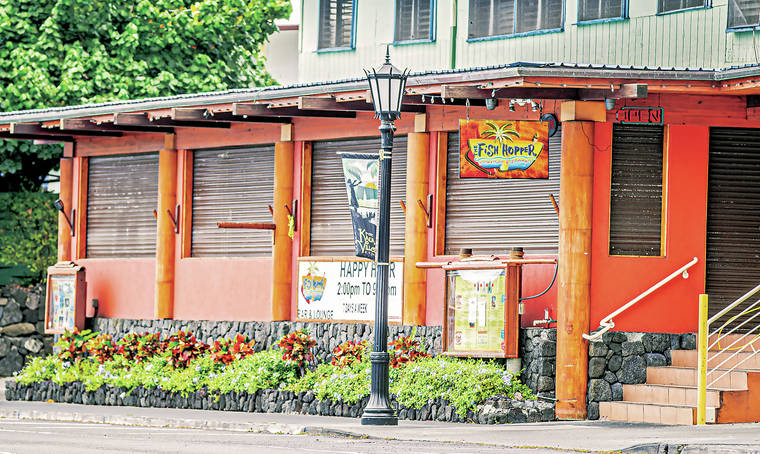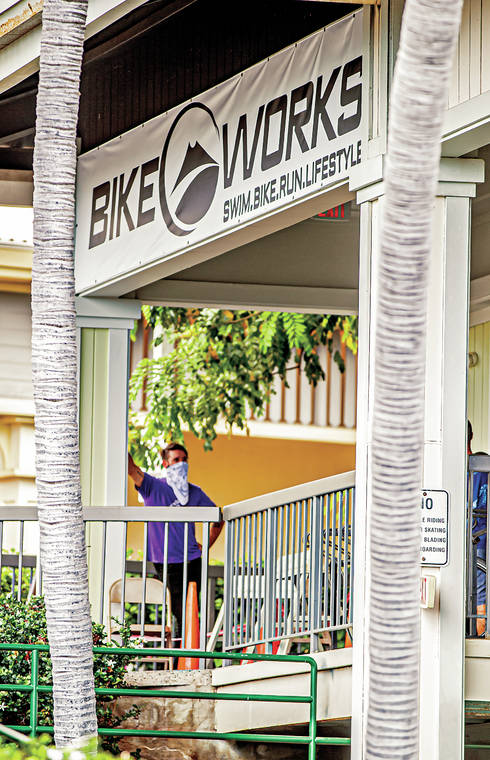Hawaii businesses brace for impact of stay-at-home extension

The Fish Hopper remains closed as Governor Ige extended Hawaii’s stay-at-home order through May 31. Though the restaurant is closed, it has been providing food to their 72 furloughed employees throughout the stay-at-home order’s duration. Tom Linder/West Hawaii Today

As an essential business, Bike Works Kona has been open, but significantly impacted, since Hawaii’s stay-at-home order was announced. Tom Linder/West Hawaii Today
Hawaii Island’s businesses are trying to remain optimistic as they grapple with the challenge of staying afloat for another month after Gov. David Ige extended Hawaii’s stay-at-home order through May 31.
Hawaii Island’s businesses are trying to remain optimistic as they grapple with the challenge of staying afloat for another month after Gov. David Ige extended Hawaii’s stay-at-home order through May 31.
With visitor arrivals to the islands averaging approximately 125 per day, down from a daily average of more than 30,000 in 2019, even businesses deemed essential are feeling the squeeze from the lack of tourism. All have been forced to adjust their practices in order to keep the doors open.
“All of our businesses have adapted very quickly,” said Kona Commons spokeswoman Katie Kaanapu. “The restaurants are all offering curbside takeaway; all of the essential businesses — Target, Office Max, Petco, the bank, Spectrum, AT&T — they’ve all adapted very quickly and are doing OK based off the circumstances.”
Some places — like Bike Works Kona — are designing short-term business plans to bridge the gap. After creating an initial plan following the first stay-at-home order beginning March 26, they’ve now been forced to create a new one while addressing the fallout of canceled events and lack of tourists.
“It’s a moving target. It was just announced about the extension, so now we’re looking at our next 30-day business plan,” said Bike Works’ owner Janet Higa-Miller. “Where do we cut expenses? Where do we work with our landlord and our vendors for deferment? … We’re constantly looking at our business plan, adapting, changing, staying flexible.”
Others have closed their doors because of a lack of patrons. Despite closing, The Fish Hopper Restaurant has continued to feed its 72 furloughed employees throughout the stay-at-home order, turning into a de facto food bank for many of their staff still waiting to receive unemployment insurance. As of Monday, the state Department of Labor and Industrial Relations had paid claims for only 65,252 of the 221,731 unique filings, according to a report by The Honolulu Star-Advertiser.
“It’s been really tough. I would say 90% of our staff since we closed in the end of March still have not gotten their UI benefits; they’re really at this point relying on us to help them along,” said Fish Hopper General Manager Sam Johnson. “Honestly, I’m really worried about our staff not having their UI benefits kick in right away. Each day that goes by that they come in, you start to see the look on their faces. What are they going to do? How is this going to happen? We’re there to reassure them that we’re going to support them the best way that we can.”
Taking into account the difficulties businesses are facing, the outlook for the future – even if the stay-at-home order is lifted after May 31 – remains precarious.
One looming concern for many owners is the possibility of their businesses being evicted; though the state has put in place a moratorium on residential evictions, small businesses have not been given the same assurance. When asked Wednesday why a moratorium on business evictions has not been enacted, Ige did not give any rationale for the state’s decision, though he noted he is working with the attorney general to address the issue.
“Business evictions are a serious concern in our community, and I have heard from several constituents who are being evicted from their commercial space because they can only pay a portion of the lease rent, or they can’t pay the month’s rent at all,” said state Rep. David Tarnas, D-North Kohala, South Kohala and North Kona. “They have contacted me and appealed to the governor to take action on this issue and put a moratorium on business evictions.”
Multiple stores currently under construction or renovation in Kona Commons have opening dates that remain unaffected by the pandemic. At the same time, uncertainty about the future of tourism in Hawaii creates a hazy outlook.
“We don’t have control over the tourist market,” said Kaanapu. “Kona is very tourist-heavy and not being able to plan toward anything makes the future very uncertain.”
Whenever things finally do open up, Johnson is confident local establishments will survive.
“I am getting quite a bit of phone calls from the general public letting us know that they’re supporting us, that they hope we open up soon,” he said. “In my opinion, if we get this thing lifted May 31 and we’re able to open up successfully, I think a lot of people are going to be out and about. They’re going to want to eat at restaurants; they’re going to want to dine in. Yeah, there’s a new norm, but we’re going to have to adjust accordingly. I’m already having face masks made for the staff to match their uniforms if that’s the approach we have to take.”
In the meantime, keeping spirits high until the state reopens appears to be a high priority for many businesses. Kona Commons has been focusing on positivity in its social media, including running contests, giveaways and DIY projects. As for Higa-Miller, encouraging safety and health is the priority.
“I think there is going to be a day where we can move on, but we need to learn how to get to that new normal. I think it’ll happen; we’ve just got to have the faith and the resilience to know that you can make it to that day. That’s what we’re doing,” she said.


